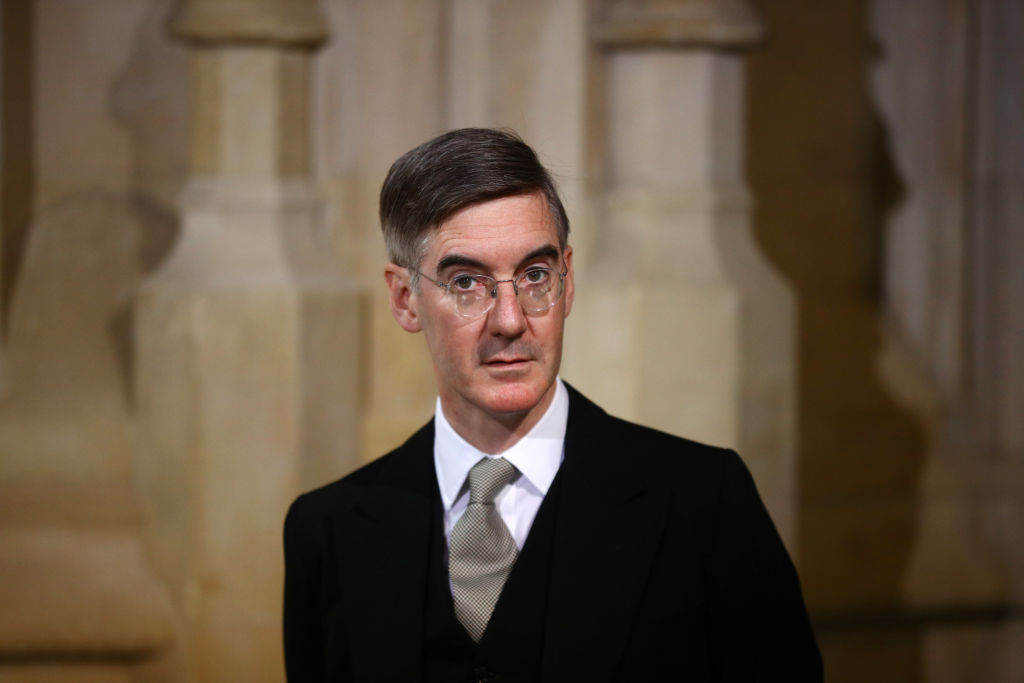Common sense is a slippier concept than you might think. Common sense, after all, might suggest you don’t put Jacob Rees-Mogg in the Cabinet. But if you have put Rees-Mogg in the Cabinet, common sense might then dictate you do not compound this avoidable error by sending him onto the radio to defend or advance government policy. Radio, much more than television, is a place pock-marked with traps for unwary politicians. And Mr Rees-Mogg is an unwary creature indeed.
A persona must be maintained, after all, even if doing so leads a politician into trouble. This is the problem with politicians whose appeal – to the extent it exists at all – is not much more than a kind of branding exercise. Mr Rees-Mogg has so thoroughly immersed himself in the peculiar fantasy of his own brand that he cannot escape it. He is not the only politician to hobble himself in this fashion. Boris Johnson and Jeremy Corbyn are each, in their own ways, confined by the limits of their brand. They must act according to type or risk undoing the very attributes that have brought them to prominence in the first place.
So when Mr Rees-Mogg suggests, however much he might wish it otherwise, that residents in Grenfell Tower who heeded the fire brigade’s advice to stay put in their flats lacked ‘common sense’ he is, however much you might think he has a point, very much ‘on brand’. And on one level, you can understand his point: remaining in the building seems counter-intuitive. It lacks common sense.
But then there is this too: should you find yourself in such an appalling situation do you heed the advice of fire experts – who, after all, know more about these matters than you – or do you ignore it? Heeding the advice could be reckoned ‘common sense’ too. And in moments of high confusion, when so much seems uncertain and even unknowable, it takes courage or daring or even, perhaps, a certain recklessness to ignore the advice given by those people in authority who must, surely, have some good reasons for recommending a particular course of action.
The headlines for Mr Rees-Mogg and his party will be terrible and they are made worse, much worse, by the fact his remarks are so very easily perceived as being so very ‘on-brand’. Hark at the patrician Tory talking down to the common folk; gasp at his apparent heartlessness. Wonder at how it came to be that this man, the proud owner of a carefully crafted reactionary persona, is at the heart of the British government. In 2019.
Some reactions will be severely extreme and lapse into unfairness. But even Mr Rees-Mogg’s defenders or those inclined to grant him some measure of the benefit of the doubt, must surely concede that some of his critics have a point too. For Rees-Mogg’s sin here is an original one. The question is not whether he really thinks Grenfell residents were foolish – I doubt he believes that (and he has since apologised for the remarks) – but whether he can demonstrate the empathy required to sympathise with their predicament.
In that sense, Grenfell is merely a small, if horrific, representation of the whole. By what right, and to what degree, can a politician such as Jacob Rees-Mogg appreciate or understand or empathise with the lives of voters whose experiences are so very far removed from his own? There are rather of lot of these voters, after all. This is not a difficult question and it is one answered again by his interview with Nick Ferrari this morning.
The Conservative party’s original sin is that it is the party for the affluent and the comfortable. This is not, and never has been, the whole truth about the Conservative party but it is a truth sufficiently significant as to require constant mitigation in the same way as the Labour party must, in modern Britain where the middle-class are as numerous as the working-class, always remind itself that it must be more than just a party for the workers.
Jacob Rees-Mogg, whatever his personal qualities and however polite he may be in person, is a walking reiteration of some of the Tory party’s weakest attributes. We all know that presentation and perception matter in politics just as we know that some people lack the standing to say things that might be accepted were they said by other, rather different, people. The blunder, then, was not just what Rees-Mogg said but that it was said by Rees-Mogg.
His appeal, such as it may be, is a question of style and attitude. There are those who like his schtick but it is a performance whose attraction is neither wide nor real; fine as an occasional diversion or period-piece entertainment but not, in the end, something to be taken seriously. Which since Jacob Rees-Mogg would very much like to be taken seriously is a problem for him.
And the difficulty for Rees-Mogg is that when he talks of ‘common sense’ in relation to something like the Grenfell tragedy he will, just for a moment, actually be taken seriously. Because, just as when Jeremy Corbyn expresses his admiration for the Bolivarian revolution in Venezuela, these remarks indicate something important about what he really thinks or, rather, how he really sees the world. The deeper truth is more significant than the meaning of the words themselves.
That, in the end, is a question of brand too and it is why just as Corbyn is a poor vehicle for Labourism so Rees-Mogg is a dreadful carrier of the Tory message. If you wish to confront and refute stereotypes, you do not put the embodiment of those stereotypes into situations where they can only confirm them. You can build your brand, for sure, but eventually you will be imprisoned by it too.








Comments